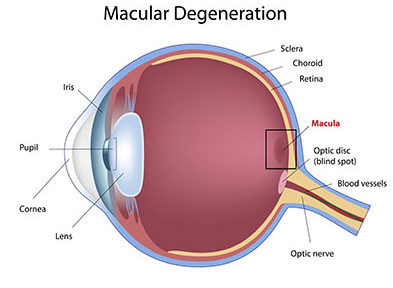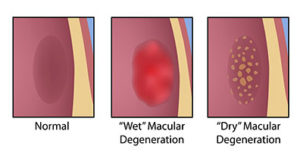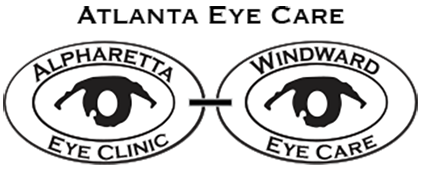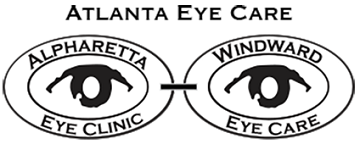 Age-Related Macular Degeneration
Age-Related Macular Degeneration
Macular Degeneration is a progressive eye disease, typically seen in older people, distinguished by gradual vision loss in the central part of the visual field. It’s the primary cause of serious vision loss in individuals 60 years of age or older. Because the condition continues to develop, as a person grows old, it’s commonly known as AMD, age-related macular degeneration. Even though the disease is virtually never a complete and absolute blinding disorder, it can, however, be an important source of visual impairment. The doctors at Atlanta Eye Care and Windward Eye Care can diagnose and treat macular degeneration using the most advanced tools and techniques available today.
Types of Macular Degeneration
 Dry Form: The dry form of AMD is characterized by the existence of yellowish deposits known as “drusen” in the macula. A few tiny drusen may not produce noticeable changes in a person’s vision. But, if they keep growing in size and proliferating, they could result in distortion or dimming of vision that individuals notice the most when they try to read. Most people with AMD have the dry form and generally lose some part of their central vision. But the dry form can also eventually lead to the wet form.
Dry Form: The dry form of AMD is characterized by the existence of yellowish deposits known as “drusen” in the macula. A few tiny drusen may not produce noticeable changes in a person’s vision. But, if they keep growing in size and proliferating, they could result in distortion or dimming of vision that individuals notice the most when they try to read. Most people with AMD have the dry form and generally lose some part of their central vision. But the dry form can also eventually lead to the wet form.
Wet Form: The wet form of AMD is characterized by the development of irregular blood vessels from the choroid just beneath the macula. This is referred to as Choroidal Neovascularization. These particular blood vessels tend to leak fluid and blood into the retina producing distorted vision that makes straight lines appear wavy. Other aspects include blind spots and central vision loss and may lead to a complete loss of central vision in someone. If you’re experiencing any of these symptoms, contact Atlanta Eye Care as soon as possible.
Risk Factors
AMD is more widespread in the elderly. In fact, it’s the primary cause of a serious loss of vision in people age 60 and over. AMD may have a hereditary aspect, which means it could possibly be passed along from generation to generation. If you have a family history of AMD, the risk goes up for developing the disease. Here are some other risk factors:
- Smoking
- High cholesterol
- High blood pressure
- Being fair skinned
- Female
- Obesity
- Light eye color
Symptoms
In the initial stages of AMD, no noticeable symptoms may be present until it affects both eyes. Usually, one of the first signs of AMD is a blurry, dim spot in the center of your line of vision. The spot may darken or grow bigger in size over time. Other symptoms include:
Treatment
Presently, there isn’t any cure for AMD. However, treatment may work to prevent further vision loss or diminish the ongoing progression of the condition a great deal. Many available options include:
- Photodynamic laser therapy
- Anti-angiogenesis drugs
- Laser therapy
- Low vision aids
- Vitamins
You will be in good hands with the doctors and staff at Alpharetta Eye Clinic or Windward Eye Care. If you live in or around Alpharetta, GA, you are close to one of our locations. Macular degeneration is one of several age-related eye conditions which should be diagnosed as early as possible. Make an appointment for an exam so we can discuss your eye health with you.

